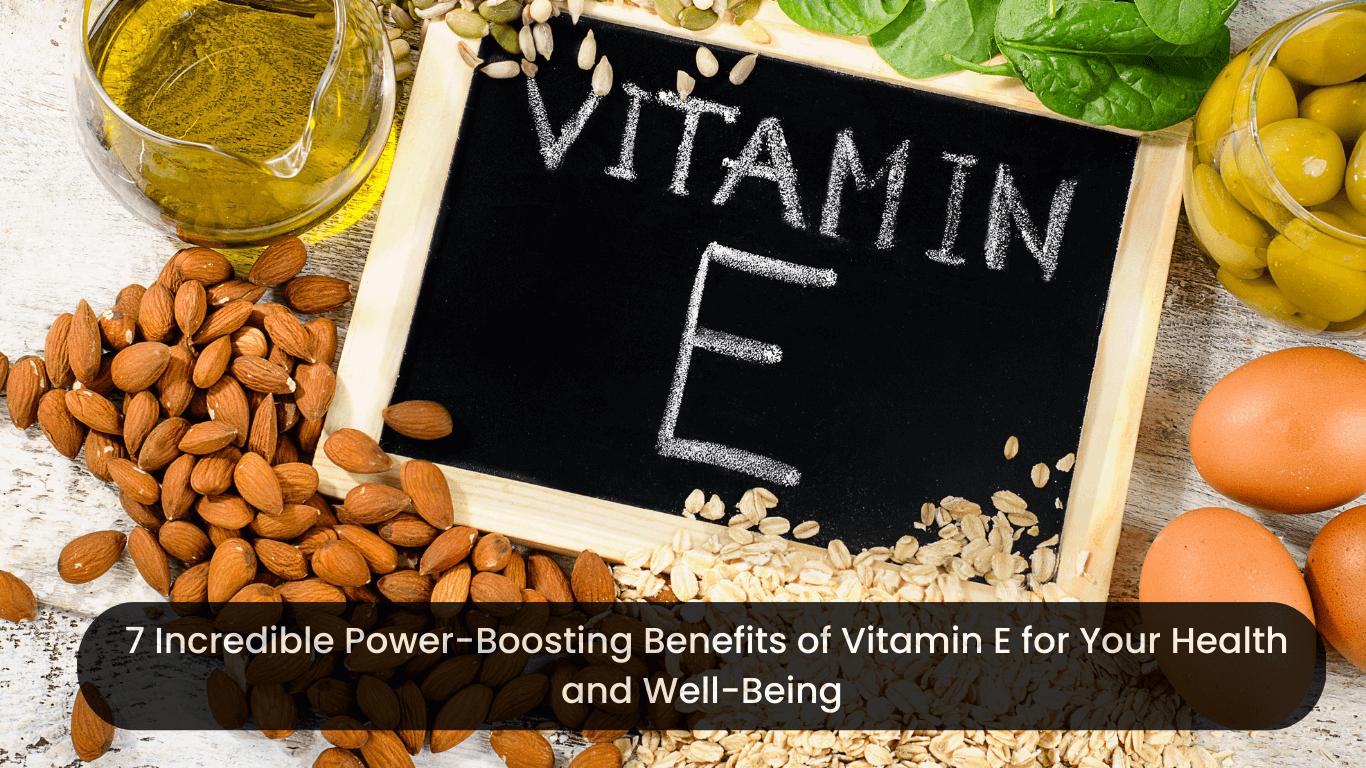Contents
Introduction
Vitamin E, a fat-soluble antioxidant, plays a vital role in maintaining overall health and well-being. Its numerous benefits include protecting the body from cellular damage, promoting healthy skin and eyes, and supporting the immune system. In this comprehensive guide, we’ll explore the seven incredible power-boosting benefits of Vitamin E, delve into its various forms, and discuss the best dietary sources and supplementation options to help you harness the full potential of this essential nutrient.
- Potent Antioxidant Protection
One of the primary benefits of Vitamin E is its antioxidant properties. Antioxidants neutralize harmful free radicals, which are unstable molecules that can cause oxidative stress and cellular damage, contributing to aging and various chronic diseases. By incorporating Vitamin E into your diet, you can protect your cells from oxidative damage and reduce the risk of conditions such as heart disease, cancer, and neurodegenerative diseases.
- Heart Health Support
Vitamin E plays a crucial role in supporting heart health. Its antioxidant properties can help reduce inflammation, lower bad cholesterol levels (LDL), and prevent the oxidation of LDL cholesterol, which contributes to plaque buildup in the arteries. Furthermore, Vitamin E can improve blood vessel function and blood flow, ultimately reducing the risk of heart disease and stroke.
- Immune System Boost
A robust immune system is essential for defending the body against infections and diseases. Vitamin E supports the immune system by enhancing the function of immune cells, protecting cell membranes, and reducing inflammation. By ensuring an adequate intake of Vitamin E, you can boost your immune system and maintain overall health and wellness.
- Skin Health and Anti-Aging Benefits
Vitamin E is well-known for its positive effects on skin health. Its antioxidant properties can protect the skin from damage caused by free radicals, ultraviolet (UV) radiation, and environmental pollutants. Additionally, Vitamin E helps maintain skin moisture, promotes wound healing, and reduces the appearance of scars, fine lines, and wrinkles. Incorporating Vitamin E into your skincare routine, either through diet or topical application, can result in healthier, more youthful-looking skin.
- Eye Health and Vision Preservation
Vitamin E plays a vital role in maintaining eye health and preventing age-related vision decline. Its antioxidant properties can protect the delicate tissues of the eyes from oxidative damage and help reduce the risk of age-related macular degeneration (AMD) and cataracts. By consuming foods rich in Vitamin E or taking supplements, you can support healthy vision and eye health as you age.
- Cognitive Function and Neuroprotection
Emerging research suggests that Vitamin E may have neuroprotective effects and support cognitive function. Its antioxidant properties can protect brain cells from oxidative damage, which contributes to cognitive decline and neurodegenerative diseases such as Alzheimer’s and Parkinson’s. Ensuring an adequate intake of Vitamin E may help preserve cognitive function and reduce the risk of developing neurological disorders.
- Reduced Inflammation and Improved Joint Health
Chronic inflammation is linked to various health conditions, including arthritis, diabetes, and heart disease. Vitamin E can help reduce inflammation in the body, thanks to its antioxidant and anti-inflammatory properties. This reduction in inflammation can result in improved joint health and reduced pain for individuals with conditions such as osteoarthritis and rheumatoid arthritis.
Vitamin E Forms and Dietary Sources
Vitamin E is available in eight different forms, including four tocopherols (alpha, beta, gamma, and delta) and four tocotrienols (alpha, beta, gamma, and delta). The most biologically active and well-studied form is alpha-tocopherol.
The best dietary sources of Vitamin E include:
- Nuts and seeds: Almonds, sunflower seeds, hazelnuts, and peanuts are rich in Vitamin E and make for convenient, nutrient-dense snacks.
- Vegetable oils: Sunflower, safflower, and wheat germ oils are excellent sources of Vitamin E. Use them in moderation, as they are high in calories and fat.
- Green leafy vegetables: Spinach, kale, and Swiss chard contain modest amounts of Vitamin E, contributing to a well-rounded, nutrient-dense diet.
- Fruits: Kiwi, avocado, and mango are delicious fruits that provide a good dose of Vitamin E.
- Fortified cereals and whole grains: Some breakfast cereals and whole-grain products are fortified with Vitamin E, making them a convenient option for boosting your daily intake.
Supplementation and Recommended Daily Intake
For individuals who have difficulty meeting their Vitamin E needs through diet alone, supplementation may be a viable option. Vitamin E supplements are available in various forms, including natural and synthetic alpha-tocopherol, as well as mixed tocopherols and tocotrienols.
The recommended daily intake of Vitamin E for adults is 15 milligrams (22.4 International Units) of natural alpha-tocopherol or 33 International Units of synthetic alpha-tocopherol. It’s essential to consult with a healthcare professional before starting any supplementation, as excessive Vitamin E intake can result in adverse effects and interact with certain medications.
Potential Side Effects and Interactions
Vitamin E is generally safe when consumed in moderation through diet or supplementation. However, excessive intake, particularly from supplements, can lead to side effects such as nausea, diarrhea, stomach cramps, and an increased risk of bleeding.
Individuals taking blood-thinning medications, such as warfarin, should exercise caution when supplementing with Vitamin E, as it may increase the risk of bleeding. Additionally, Vitamin E can interact with certain medications, including chemotherapy drugs, statins, and niacin. Always consult your healthcare provider before beginning any supplementation, especially if you are taking medications or have underlying health conditions.
Conclusion
Vitamin E is a powerful, health-promoting nutrient with numerous benefits, including antioxidant protection, heart health support, immune system boosting, skin health enhancement, eye health preservation, cognitive function support, and reduced inflammation. By incorporating Vitamin E-rich foods into your daily diet or using supplements under the guidance of a healthcare professional, you can harness the incredible power-boosting benefits of this essential vitamin and support your overall health and well-being.

